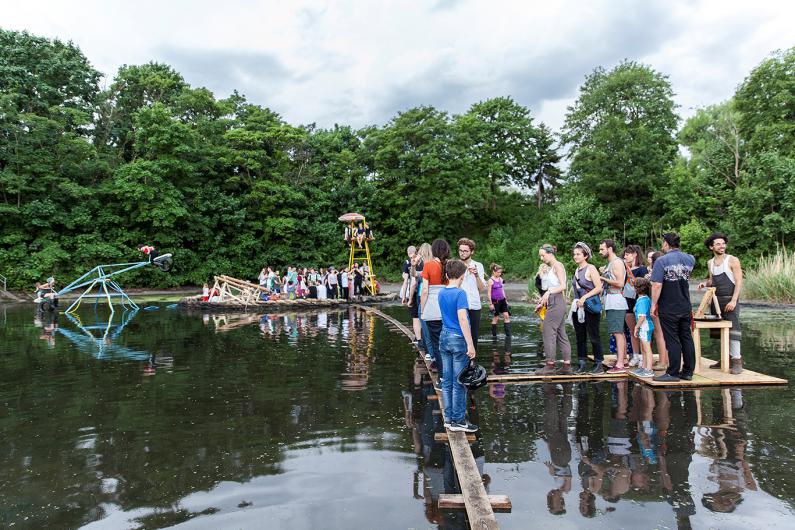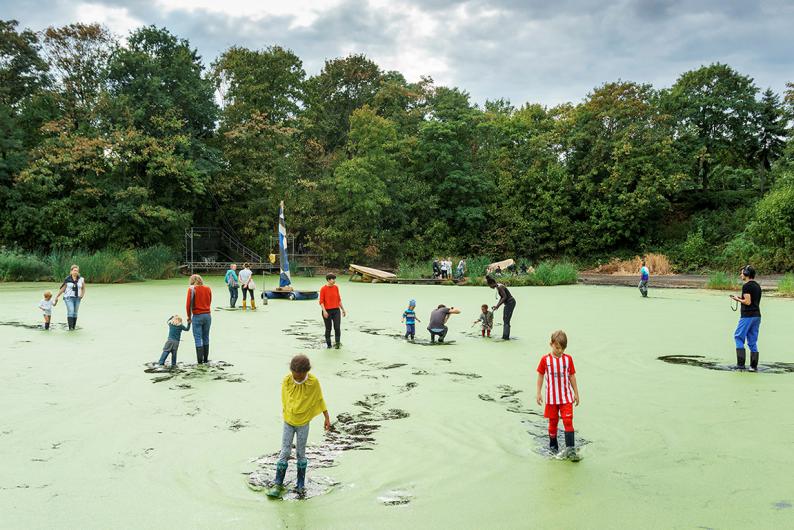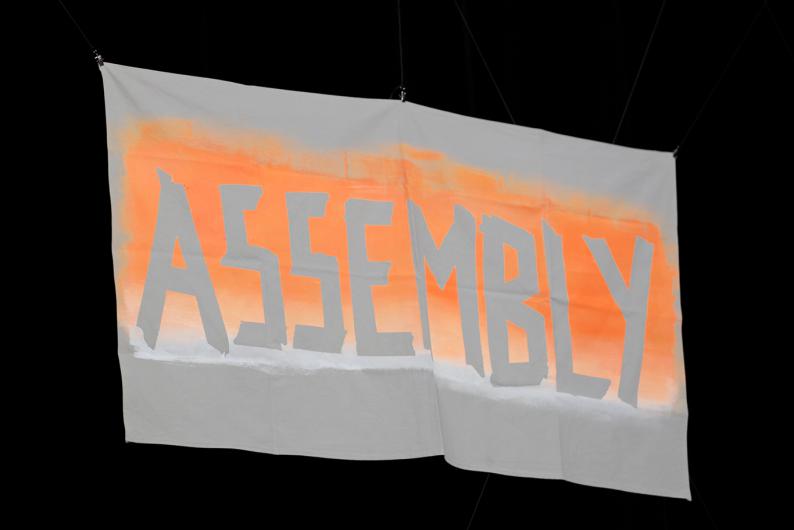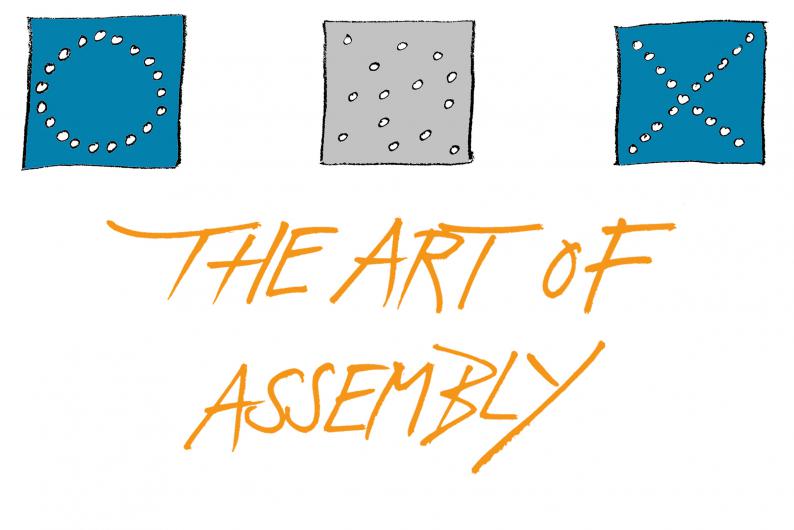With Merve Bedir, Benjamin Foerster-Baldenius / raumlabor berlin & Marina Otero Verzier. Hosted by Florian Malzacher
Gesellschaftsspiele – The Art of Assembly XI in cooperation with Goethe-Institut / Performing Architecture
ARCHITECTURES OF HOSPITALITY
Hospitality – with all its seeming generosity – is a complex concept: Who is invited into our societies, our assemblies? What are the relationships between guests and hosts? Is unconditional hospitality possible? The architecture of public space, the infrastructures of coming together, the borders and thresholds around them inform how we come together, what is prevented from happening, what is possible. The 11th edition of The Art of Assembly looks at the physical relations of gatherings, how bodies and objects are organised, how radical concepts of democracy can be represented in space. Architect and researcher Merve Bedir since long researches infrastructures of hospitality and mobility as well of the residue of solidarity in urban and public space. For raumlabor architecture is a tool, in search for a city of possibilities, considering themselves activists, operating within the urban landscape. And for architect and scholar Marina Otero Verzier is concerned with how the work of architects, in coordination with other social and institutional techniques, produces differential spaces that either facilitate or prevent their encounter of bodies.
 Visit art-of-assembly.net for videos, podcasts and background info
Visit art-of-assembly.net for videos, podcasts and background info
Gesellschaftsspiele. The Art of Assembly is a series of lectures and conversations on the potential of assemblies in activism, art and politics hosted by Florian Malzacher. Former and future guests include Judith Butler, Jodie Dean, Radha D`Souza, Didier Eribon, Max Haiven, Oliver Marchart, Alia Mossallam, Chantal Mouffe, Sibylle Peters, Milo Rau, Oliver Ressler, Jonas Staal & Dana Yahalomi. The series is produced by brut Wien, in cooperation with Münchner Kammerspiele, Wiener Festwochen and Volksbühne am Rosa-Luxemburg-Platz.
About The Art of Assembly. Lectures, discussions, online platform
Whether in Tunis, Cairo, Madrid, or Lisbon, in Athens, New York, London, or Istanbul, in post-Fukushima Tokyo, in the midst of Niemeyer’s iconic parliamentary architecture in Brasilia, under the umbrellas of Hong Kong, or on the streets of Minneapolis: social and political movements of recent years have often been characterised by their search for alternative forms of gathering, of arguing and making decisions, of negotiating community and society. The potential of these assemblies lies in more than just the demands they put forward; many of them change reality merely by practicing radical models of democracy.
The arts have also shown a renewed interest in concepts of gathering and creating public spheres in which society is not only mirrored but constantly tried out, performed, tested, reimagined, or even reinvented. There are court hearings on artistic freedom, religion, and censorship; tribunals on exploitation and violence; summits on climate change or cultural policy; parliaments allowing those who are usually silenced to speak... Theatre in particular has become a stage for assemblies on the fine line between art and reality, a democratic arena of radical imagination.
But what is the future this concept of gathering has ahead of it after months in a state of emergency that has thrown pretty much all areas of social life out of step? Gesellschaftsspiele: The Art of Assembly brings together protagonists from various fields of art, politics and theory to speculate on the future of assembly in a time of experiencing that nothing is certain – a time in which every form of physical togetherness has become precarious.
The guests of the evening:
Merve Bedir is an architect and researcher. She holds a BA in architecture from the Middle East Technical University, Ankara/Turkey (2003) and a PhD from the Delft University of Technology/The Netherlands (2017). She is the co-founder of the architecture and urban design office Land and Civilization Compositions, Rotterdam/The Netherlands and Hong Kong, and the Aformal Academy, Shenzhen/China and Hong Kong. Her research focuses on human and non-human flows and infrastructures, and the incursion of advanced technologies into built environments. Bedir curated the exhibitions uncommon river, Plovdiv/Bulgaria and Vocabulary of Hospitality, Istanbul/Turkey, and co-curated Automated Landscapes, Shenzhen/China. Her work has featured in the biennales of Venice/Italy, Istanbul Design/Turkey, Shenzhen/China, Saõ Paulo/Brasilia and the Oslo Triennale/Norway. She has written for Harvard Design Magazine, AD Magazine, Volume and Funambulist, among others. Bedir has taught at Hong Kong University, Hong Kong Design Institute, Columbia GSAPP, New York/USA and Delft University of Technology. Bedir is a founding member of the initiative Migrant Kitchen in Gaziantep/Turkey, as well as of the Center for Spatial Justice (MAD) in Istanbul. Her work has been supported by the Prince Claus Fund, the European Cultural Foundation, the EU Creative Europe program, UNDP and others, and has been reviewed in The Guardian, Metropolis magazine and Avery Review.
Benjamin Foerster-Baldenius / raumlabor berlin is an architect based in Berlin. In 1997 he founded the “Institut für Angewandte Baukunst” (Institute of Applied Architecture). He is one of the members of raumlabor, the collective of architects working at the intersection of architecture, research, urban planning and art since 1999 , contributing to the 9th, 10th, 11th, 12th and 13th Architecture Biennale in Venice. In 2010/11 he has been Professor of Architecture at the Academy of Art, Architecture and Design in Prague (VSUP) and since than teaching and leading various workshops at various art, architecture and design institutions around Europe. In 2021 raumlabor berlin was awarded the Golden Lion at the Venice Architectural Biennale.
Marina Otero Verzier is an architect based in Rotterdam. She is Director of Research at Het Nieuwe Instituut (HNI) and head of the Social Design MA at Design Academy Eindhoven. At HNI, Otero works to give visibility to research projects, practices, and initiatives that depart from established modes of thinking. Examples include Automated Landscapes (focusing on emerging architectures of automated labour) and BURN-OUT. Exhaustion on a planetary scale (instigating other forms of coexistence and care for multispecies, collective bodies). She was previously Director of Global Network Programming at Studio-X in New York. Otero was a member of the Artistic Team for Manifesta 13, and Curator of WORK, BODY, LEISURE, the Dutch Pavilion at the 16th Venice International Architecture Biennale in 2018. With the After Belonging Agency, she was Chief Curator of the Oslo Architecture Triennale 2016. She studied at TU Delft and ETSA Madrid and Columbia University GSAPP. In 2016, Otero received her PhD at ETSA Madrid.
Florian Malzacher is a curator, dramaturg and writer. 2013-2017 he was artistic director of Impulse Theater Festival (Cologne, Dusseldorf and Mulheim/Ruhr), and 2006–2012 co-programmer of the multidisciplinary arts festival steirischer herbst (Graz). He (co-)curated e.g. the 4th and 5th International Summer Academy (Mousonturm Frankfurt, 2002 and 2004), “Dictionary of War” (2006/07), “Truth is concrete” (Graz, 2012), “Artist Organisations International” (HAU Berlin, 2015), “Appropriations” (Ethnological Museum Berlin, 2014), “Sense of Possibility” on the occasion of the 100th anniversary of the revolution (St. Petersburg, 2017), “Training for the Future” (Ruhrtriennale 2018/19 with Jonas Staal), “After Supervising the Machinery” (2020). As a dramaturge he worked with artists like Rimini Protokoll (DE), Lola Arias (ARG), Mariano Pensotti (ARG), and Nature Theater of Oklahoma (USA). Florian Malzacher has edited and written numerous essays and books on theatre and performance and on the relationship between art and politics. His latest publications include Gesellschaftsspiele. Politisches Theater heute im Alexander Verlag Berlin. florianmalzacher.tumblr.com
The Art of Assembly is based on
Florian Malzacher. Gesellschaftsspiele. Politisches Theater heute. Berlin: Alexander Verlag, 2020.
Credits
With Didier Eribon Chantal Mouffe, Sibylle Peters, Julia Ramírez-Blanco, Milo Rau, Oliver Ressler, Dana Yahalomi / Public Movement, Jodi Dean, Jonas Staal and many more Curated by Florian Malzacher
The Art of Assembly – Gesellschaftsspiele, a series by Florian Malzacher and brut Wien, in cooperation with Münchner Kammerspiele, Wiener Festwochen, Volksbühne am Rosa-Luxemburg-Platz (Berlin), BIT Teatergarasjen / METEOR 2021 and Goethe-Institut / Performing Architecture.
Dates & Tickets
Please read our Covid-19 regulations here
INFO: Registration is only necessary for attending the event at brut northwest. The live stream can be accessed without registration at brut-wien.at.
For this event at brut nordwest the 2G+ rule applies. Further information
November 2021
Admission free, Registration is only necessary for attending the event at brut northwest. The live stream can be accessed without registration at brut-wien.at.
brut nordwest
Nordwestbahnstraße 8-10, 1200 Vienna
accessible



